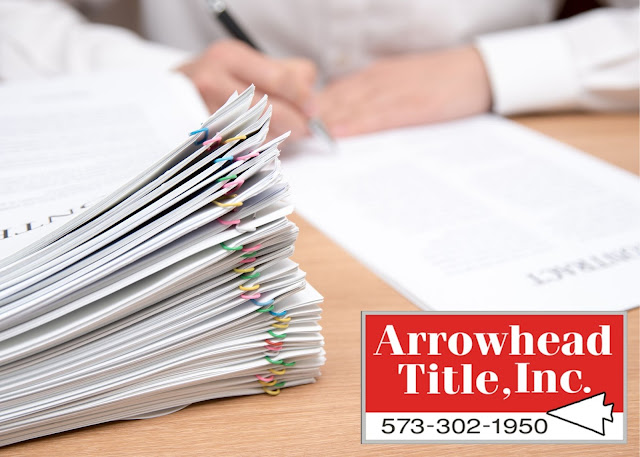Understanding Closing Costs Part 1: What is Included in the Closing Costs?
When we talk about the costs of buying real estate at the Lake of the Ozarks, we talk about several different things. Buying and selling real estate is a complicated transaction that requires careful attention and precision from every party involved. In addition to the funds being transferred as a result of the sale, there are multiple expenses that must be satisfied in order to complete the transaction. The home inspection, home appraisal, and earnest money are just a few examples. The other major expenses are lumped together in a broad category that is simply called "closing costs."
Title insurance can be confusing for home buyers. What type of title insurance policy is required to own a home and who is responsible for paying the closing costs and title insurance? It is important to understand the intricacies that go into the home buying process. First, you need to understand what closing is and what is included in the closing costs. Arrowhead Title, Inc. is here to explain the buyer's closing costs for you in simple, easy-to-understand terms.
What is Closing on a Real Estate Transaction?
Closing is the point during the sale of property when the title is transferred to the home buyer from the home seller. Closing costs are the fees associated with the purchase of the home and are paid at closing.What Are Closing Costs?
Closing costs encompass a wide variety of different fees and services. There are many different types of closing costs that come along with the purchase of real estate. Typical closing costs generally fall into one of nine categories.The 9 types of typical closing costs include:
1. Mortgage Origination Fees
2. Discount Points
3. Appraisal Fees
4. Title Insurance
5. Real Estate Agent Fees
6. Prepaid Costs
7. Private Mortgage Insurance (PMI)
8. Recording Fees and Taxes
9. Other Miscellaneous Closing Cost
Who Pays for Closing Costs?
Buyers and sellers typically both pay different real estate closing costs during a transaction. The types and amounts of buyer closing costs and seller closing costs depend on a variety of factors, including the location of the property, the purchase price, and if financing is involved.What Is Included in the Buyer’s Closing Costs?
Buyer closing costs are what the buyer is responsible for paying other than the purchase price of the property. While it is important to recognize that the exact expenses involved in closing on the purchase of a property will vary from transaction to transaction, there are many elements that are consistent when it comes to the costs that buyers are responsible for in a real estate transaction. Below is a quick overview of some of the common items that are typically included in the closing costs:- Loan Origination Fees
- Credit Report
- Courier Fee
- Survey Fee
- Title Search
- Lender's Policy Title Insurance
- Owner's Policy Title Insurance
- Home Appraisal Property Tax
- Underwriting Fee
- Processing Fee
- Pre-Paid Mortgage Interest
- Home Owners Association Transfer Fees (if applicable)
Average closing costs on the median home sales price of $230,000 are 2 percent to 5 percent, or $4,600 to $11,500, according to studies done by Fit Small Business. The buyer's closing costs typically add up to about 2.5% - 4% of the total loan amount, but there may be some options to help reduce the buyer's upfront costs. Some mortgage loans allow these costs to be financed into the loan, for example, and sometimes you can negotiate with the sellers to have them cover part (or all) of these expenses.
What Is NOT Included in the Buyer’s Closing Costs?
While the buyer's closing costs encompass quite a bit of the fees associated with closing on a home, there is one major expense that the buyer is not responsible for: the real estate agents' fees. Both the buyer's agent and the seller's agent will receive commission on the sale at the time of closing. This money comes out of the purchase price of the home, and the title company will ensure that these funds are distributed appropriately before the remaining sale price is delivered to the seller.Depending on the situation, sellers may also be required to cover additional costs, such as:
Loan payoff fees (or, in some cases, penalties)
Liens or judgments on the property
Unpaid property taxes
Unpaid HOA dues (if applicable)
Attorney fees (if applicable)
Any additional costs that the buyer has negotiated with the seller to pay for
The Bottom Line
Closing costs are the extra expenses that buyers and sellers pay on top of the purchase price at the settlement of a real estate transaction. The buyer’s closing costs usually include loan origination fees, discount points, appraisal fees and more. Property transactions can be difficult for home buyers on the outside, as the average person does not have that much experience with buying homes. That’s where title insurance comes in, assuring the investment you’re about to make is valid and protected from losses. After all, it may be the largest transaction you’ll ever make.Trust Arrowhead Title To Facilitate Your Transaction!
As the buyer, you have the benefit of choosing the title agency you would like to conduct your transaction. If you are shopping for title agencies at the Lake of the Ozarks, we would be honored if you would consider Arrowhead Title, Inc. We will also conduct a thorough title search at the Lake of the Ozarks that will reveal any potential issues with the title that may need to be resolved prior to closing. If you have questions about our title services at the Lake of the Ozarks, give us a call to learn more about what we can offer you.The Lake of the Ozarks' Most Trusted Title Company
Where Accuracy Matters








Comments
Post a Comment